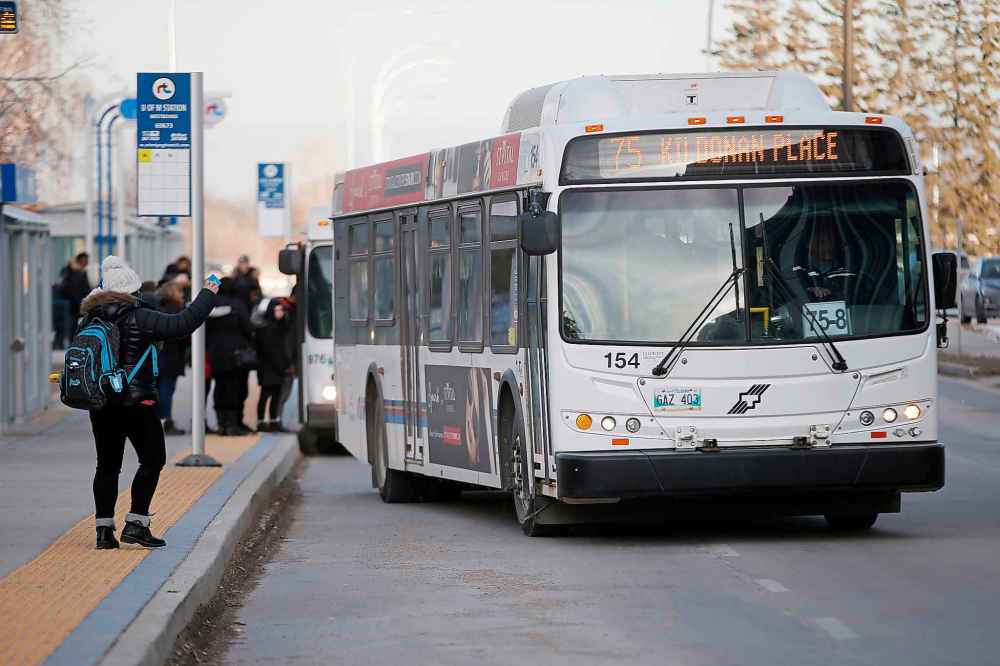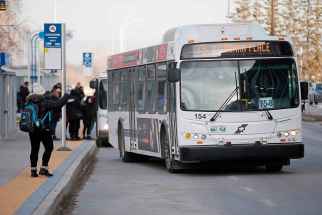Advocates decry proposed Winnipeg Transit service cuts
Read this article for free:
or
Already have an account? Log in here »
To continue reading, please subscribe:
Monthly Digital Subscription
$0 for the first 4 weeks*
- Enjoy unlimited reading on winnipegfreepress.com
- Read the E-Edition, our digital replica newspaper
- Access News Break, our award-winning app
- Play interactive puzzles
*No charge for 4 weeks then price increases to the regular rate of $19.00 plus GST every four weeks. Offer available to new and qualified returning subscribers only. Cancel any time.
Monthly Digital Subscription
$4.75/week*
- Enjoy unlimited reading on winnipegfreepress.com
- Read the E-Edition, our digital replica newspaper
- Access News Break, our award-winning app
- Play interactive puzzles
*Billed as $19 plus GST every four weeks. Cancel any time.
To continue reading, please subscribe:
Add Free Press access to your Brandon Sun subscription for only an additional
$1 for the first 4 weeks*
*Your next subscription payment will increase by $1.00 and you will be charged $16.99 plus GST for four weeks. After four weeks, your payment will increase to $23.99 plus GST every four weeks.
Read unlimited articles for free today:
or
Already have an account? Log in here »
Hey there, time traveller!
This article was published 14/11/2019 (2222 days ago), so information in it may no longer be current.
Winnipeg is “moving in the wrong direction” with proposed Transit cuts, say advocates for low-income workers and a sustainable environment.
To stay within a two per cent budget increase imposed by Mayor Brian Bowman and the executive policy committee, Winnipeg Transit has to cut a combined $5.6 million from its operating budget and another $12.8 million from its capital budget for 2020.
Administration has proposed a number of cost-saving measures, including stopping service on weekday and Saturday nights at 12:15 a.m. (instead of the current 1:38 a.m.), ending peak weekday service at 5:45 p.m. (instead of 6:30 p.m.); and cleaning bus interiors and shelters less often.

“It would be a significant setback,” Nicole Roach, sustainable transportation co-ordinator with the Green Action Centre, said Thursday.
“We’re behind every major city in Canada for transit (funding) per person,” said Roach. Cuts to bus service are not what anyone had in mind after the mayor’s declaration 2019 would be the “Year of Transit,” she said.
“We’re moving in the wrong direction, for a sustainable city. We need to invest in things that would reduce our greenhouse gas emissions.”
Having a reliable, adequately-funded transit system enables more people to use it as their primary means of transportation, she said. “And many people don’t have that option (of taking their own vehicle). They’re not left with many other options.”
“We’re behind every major city in Canada for transit (funding) per person.” – Nicole Roach, Green Action Centre sustainable transportation co-ordinator
The council-approved low-income bus pass — expected to cost $1.3 million in 2020, $3.2 million in 2021, and $5 million a year in lost fare revenue in later years — may also be scrapped.
“It’s astonishing that the city is looking at making these cuts to services,” said Josh Brandon with the Social Planning Council of Winnipeg.
“While we support the low-income bus pass, it can’t be at the expense of the overall service. Reduced maintenance and the number of buses on the road make the transit system more precarious” for all riders.
Cutting rush-hour and late-night buses will also make it tougher for working people, Brandon said.
“Low-income workers getting off their shift have to get home from work,” he said. “It will be a challenge for employees — and employers as well — when they’re working late, to ensure they have a ride home at the end of their shift if the bus isn’t available.”
The proposed cuts would “punish” people who are already missing out on opportunities, added Hannah Muhajarine, an organizer with the Manitoba Energy Justice Coalition.
“It’s something that has very much to do with social justice and social equity,” she said. “People affected by these cuts are already lower income, marginalized members of the community.”
On the environment side of the coin, Transit is a good investment in Winnipeg residents and the planet, said Roach, who co-ordinates the annual Civic Commuter Challenge for Manitoba.
“People affected by these cuts are already lower income, marginalized members of the community.” – Hannah Muhajarine, organizer with Manitoba Energy Justice Coalition
Each June, commuters are urged to walk, ride a bike, carpool or take the bus for a week. Most participants in Manitoba have said after the event they’d continue to use sustainable modes of transport, including nearly half of those participating for the first time, said Roach, who noted funding for the Civic Commuter Challenge is now on the City of Winnipeg chopping block.
For the past 15 years, Manitoba has consistently had highest participation rate of any Canadian province, she said. “The most significant mode of transportation is Transit. We should be investing more, not making cuts.”
carol.sanders@freepress.mb.ca

Our newsroom depends on a growing audience of readers to power our journalism. If you are not a paid reader, please consider becoming a subscriber.
Our newsroom depends on its audience of readers to power our journalism. Thank you for your support.









